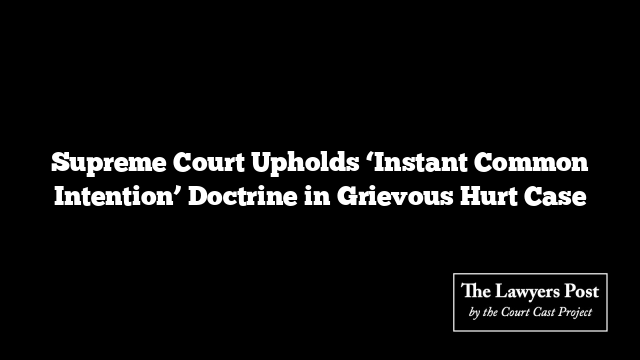The Supreme Court of India has ruled that when individuals act with a common intention during an offense, their punishment cannot be reduced merely because one participant caused less severe injuries than others. This landmark judgment reinforces the principle of shared accountability under Section 34 of the Indian Penal Code (IPC).
The case arose from an appeal by the State of Karnataka, challenging a High Court decision to downgrade the conviction of one accused (Accused No. 2) from Section 326 IPC (voluntarily causing grievous hurt with deadly weapons) to Section 324 IPC (voluntarily causing hurt with deadly weapons). The High Court had based its decision on the lesser severity of injuries inflicted by the accused compared to his co-accused.
The Supreme Court, however, rejected this rationale, emphasizing that both accused were equally complicit in the assault. Armed with deadly weapons—a knife and a chopper—they targeted two victims, inflicting injuries during the incident. The Court clarified that the presence of both individuals at the scene and their shared intent to commit harm solidified their culpability under Section 34 IPC.
The bench, comprising Justices Sudhanshu Dhulia and Prashant Kumar Mishra, underscored that common intention can emerge spontaneously during an incident and does not necessarily require prior planning. This interpretation dismantled the defense’s argument that the accused had no predetermined intent to inflict serious harm.
“Merely because the injuries caused by Accused No. 2 were less severe than those inflicted by Accused No. 3, it does not absolve him of responsibility under Section 326 IPC,” the bench stated. The Court held that reducing the conviction undermined the principle of shared liability when crimes are committed in concert.
Consequently, the Supreme Court overturned the High Court’s decision, reinstating Accused No. 2’s conviction under Section 326 IPC, read with Section 34. The Court sentenced him to two years of rigorous imprisonment, matching the punishment given to his co-accused, and imposed a fine of ₹75,000. The accused was ordered to surrender within four weeks to complete his remaining sentence.
This ruling reaffirms the judiciary’s commitment to upholding the doctrine of common intention, ensuring accountability for all participants in joint criminal acts.





